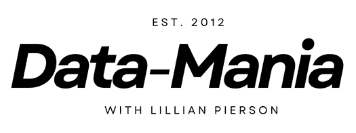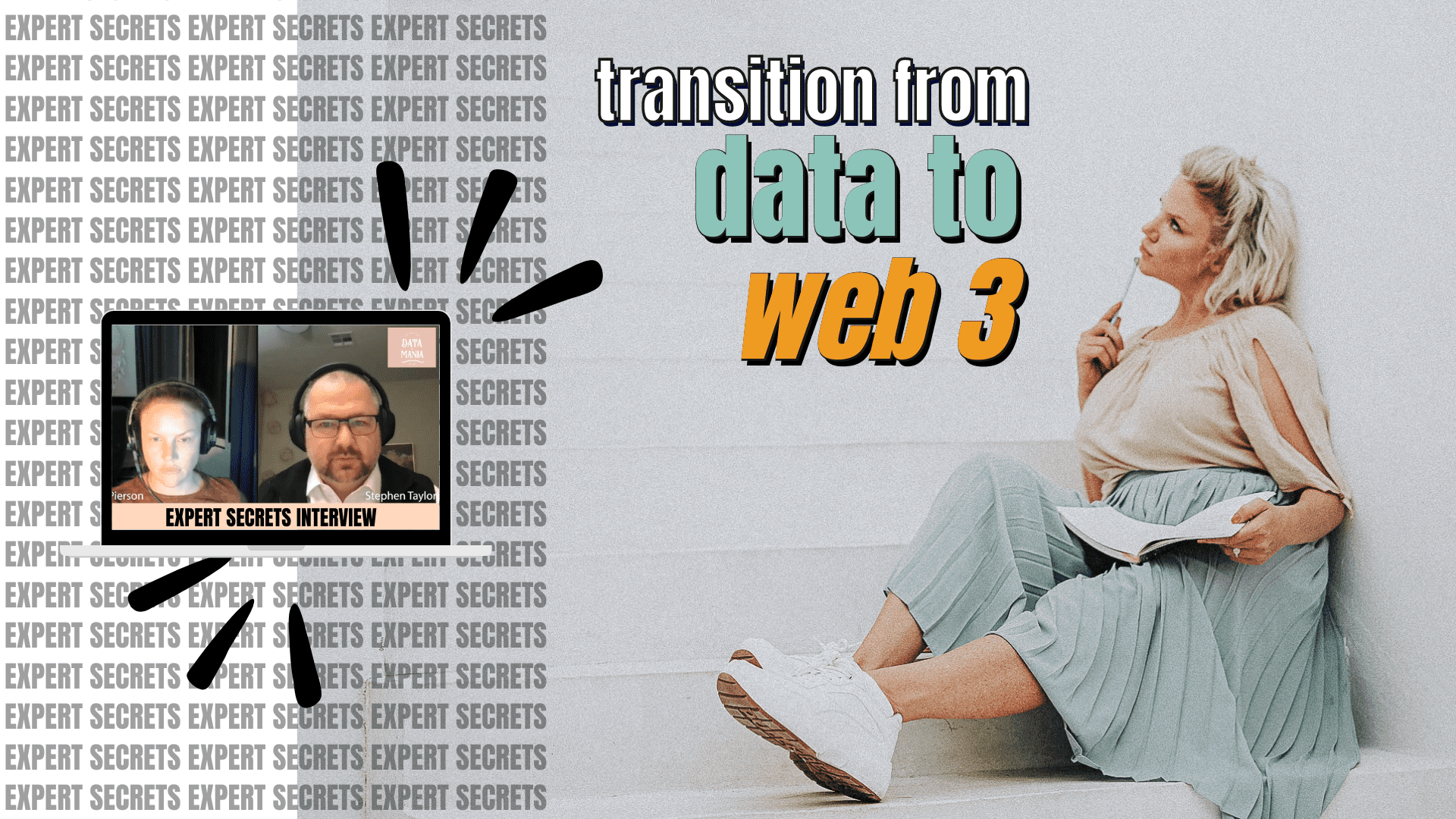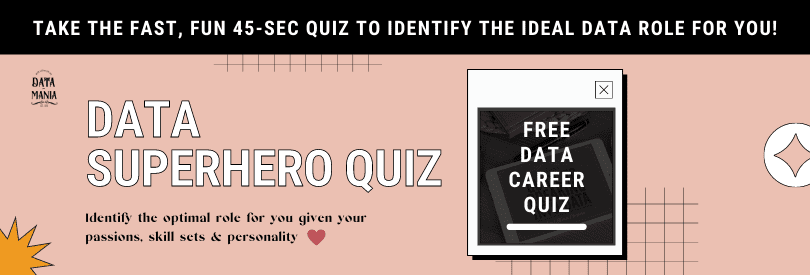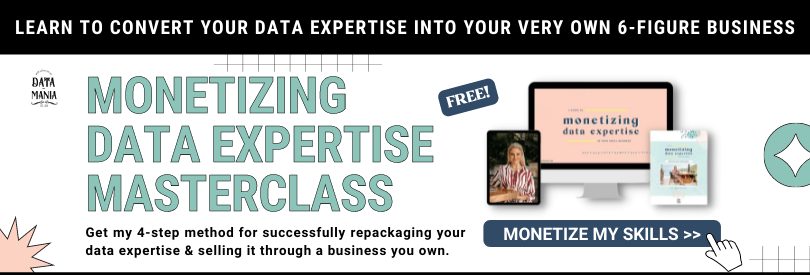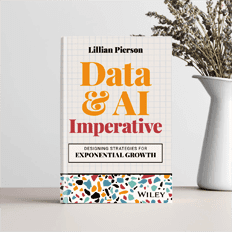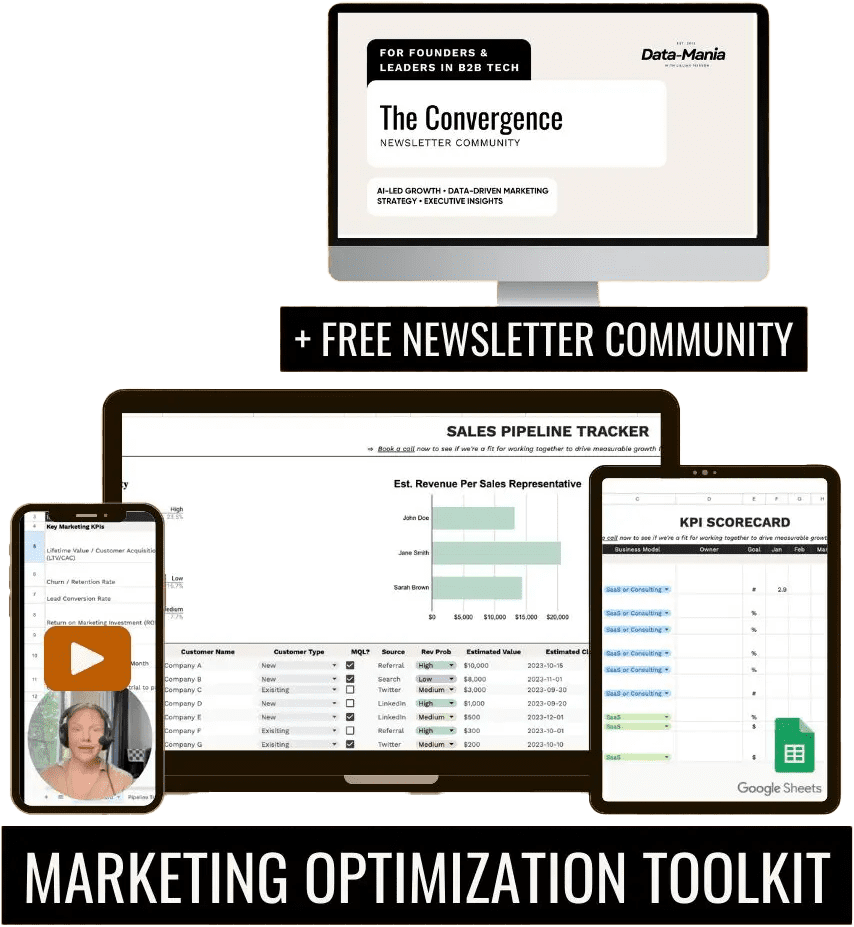If you are a data professional that’s looking to break into web 3, then this blog is for you. That’s because you’re gonna get real-life actionable career advice about data science and web 3. Additionally, you’ll learn how to transition your data science career into a web 3 career.
This advice is coming from the lips of someone who successfully transitioned from data management professional to data entrepreneur. He then became a CIO and launched the very first crypto bank in the United States. I’m referring to my former client, Stephen Taylor. If you are working on ways to combine your passion for both data science and web 3, you need to read this article.
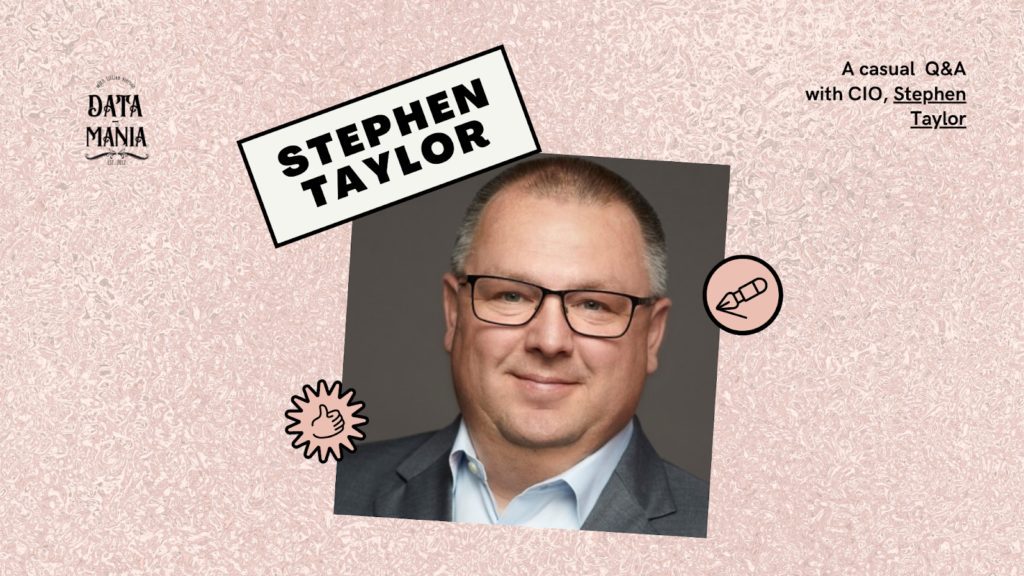
Be sure to stay till the end because that’s where I’m going to share with you the learning resource that I’m using to implement Stephen’s advice and build my very first dapp products.
For the very best data leadership and business-building advice be sure to subscribe to our YouTube channel and hit the bell icon so you can be notified when a new episode drops.
Keeping up with the trends…
Real talk, doesn’t really matter if you’re new to the data field or if you’ve been in it over ten years like me. You still need to keep on top of the trends in the industry and see where the industry is evolving. This is so you will be prepared when opportunity knocks. Reading blogs and watching videos like this one is a great way to start.
In case you’re wondering who’s writing this right now… Hi I’m Lillian Pierson, and I support data professionals in transforming to world class data leaders and entrepreneurs. To date, I’ve launched 35 technology products that have generated over $5.5 MM dollars in revenue over the last 5 years alone.
If you prefer to read instead of watch then, read on…
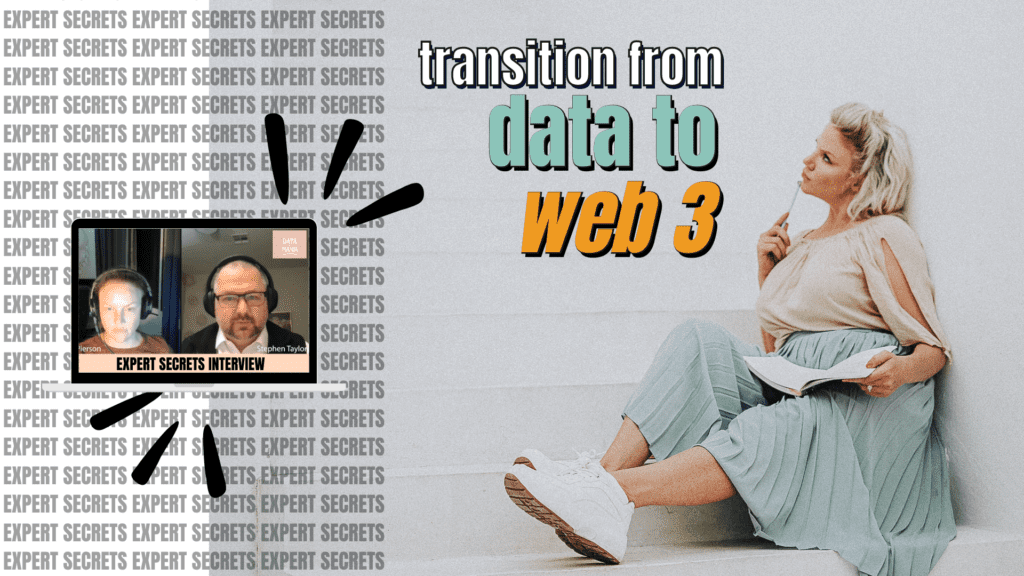
Okay with all that out of the way… Before giving you Stephen’s advice, let’s just hear from him about his data career and his story… His story of becoming a data professional… And then a data entrepreneur, and then landing a CIO role where he launched a crypto bank.
We’ll let him speak for himself.
How Stephen combined his love of data science and web 3…
“I’ve been in data as a data professional and in IT for 30 years. Most of it in management, and also, I’ve done five different startups. So, I’ve kinda done a little bit of everything.
I have gone from Fortune 500 companies to just me, to other Fortune 500 companies. I’ve been in consulting and have done a lot of consulting at some of the largest firms.
So then when this business opportunity came up (with Vast Bank) and we started looking at how do we apply (crypto) in (traditional) banking, it really took off… The more we talked, they said, “Hey, why don’t you just come join us as part of our team?”
That’s how I made that transition from running my own company (into a web 3 role).
(At that point) I said (to myself), “well, I’m running my own dedicated company, so I’m just gonna sell the company” because, even though I think my company was taking off – this opportunity (with Vast Bank was) substantial. I had to make the jump.”
The “Jump”
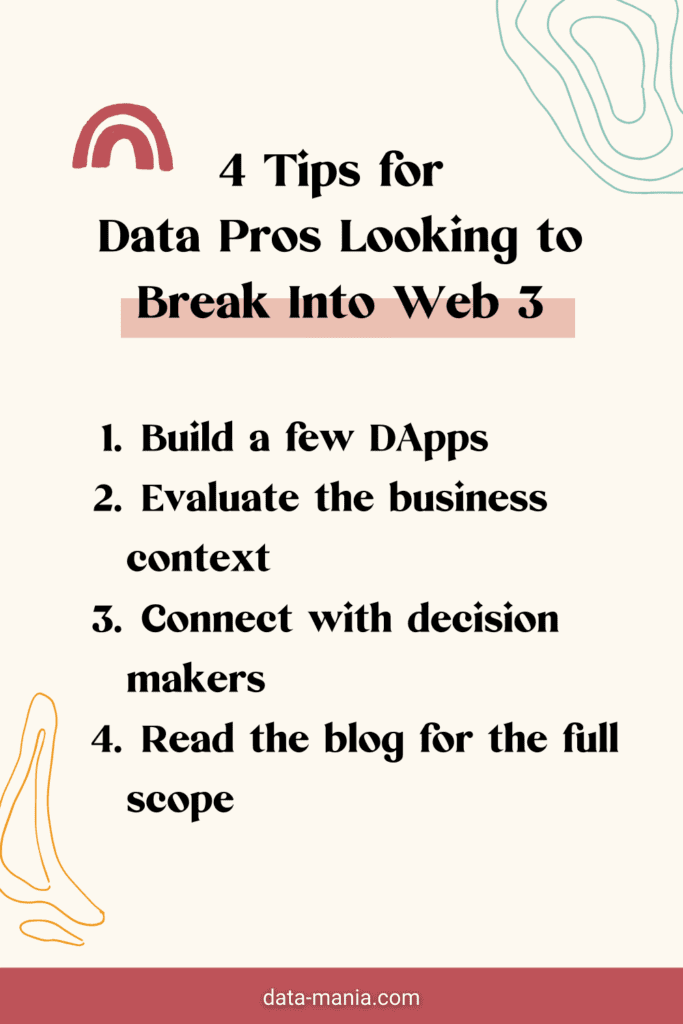 And that “jump” he’s talking about? He’s referring to launching FDIC insured Vast Bank’s entire crypto arm. Yes, a crypto bank in the United States!
And that “jump” he’s talking about? He’s referring to launching FDIC insured Vast Bank’s entire crypto arm. Yes, a crypto bank in the United States!
Yeah. And that “jump” he’s talking about? He’s referring to launching FDIC insured Vast Bank’s entire crypto arm. Yes, a crypto bank in the United States, not only was this the very first crypto bank to be launched in the United States, but it’s still the only one.
Now that you know a little more about Stephen, let’s take a look at his advice for professionals who love both data science and web 3, and who are looking to grow their career into the Web 3 space.
What career advice would you give to data professionals who want to land a job at a Web 3 company?
“I’ll start with the advice that I would give to people who want to land a job, period.
And so the first thing is, I think it’s really important that you’re able to understand the needs of the company and be able to articulate the value of how you can bring that to the table. Not just in terms of the technical skills and not just in terms of the work product, but also an understanding of the business context.
People don’t hire people just to hire people. They hire people to solve a particular problem. They hire them to do a particular function, so you need to understand the context of why they’re hiring for that particular skill. “Why are they hiring that person?”
And sometimes in my interviews, when people are asking questions about my skills… it almost becomes more of me interviewing them. I’m really trying to listen to them and understand what the situation is that they’re dealing with.
If somebody’s coming in and you know your domain, well, you have your skills and you’ve done the work… then you (can just) come in and you spend time listening to what they’re trying to do, why are they trying to do it, why are they hiring it now.
Going into specifics…
If they’re just trying to add bodies, that may not be the best opportunity. But if they’re trying to solve a regulatory issue, or they’re trying to capture a new market, or if they’re trying to reduce costs on a particular customer onboarding process… (You have to) get specific about the types of things that they’re solving.
(With this specificity, you’ll be able to understand, for example) “if I’m trying to reduce the cost of onboarding and I have 100,000 customers per year, and I’m saving them a dollar per customer, it’s a $100,000 of value I can bring to the table.”
Don’t expect them to pay more than that, in fact, don’t expect them to pay more than 50%-60% of that. (This) gives you a sense of the value.
But if they’re bringing on a billion customers and if you’re saving $5 a customer, that’s a different value proposition.
So, (you need to really) understand the business context, not just the technical context of what they’re doing and why they’re doing it.”
Do data professionals really need to learn to build crypto products before seeking work in the web 3 field?
“Yes, and they don’t have to be complicated.
You can build some Web 3 products over a period of a weekend or two. It doesn’t have to be complicated, but just build a couple of lightweight ones…
Even if they’re not big or complicated, but (you should) understand all the different pieces.
How are you gonna do data storage and persistence, how are you gonna do cleansing, how are you gonna do integration with other systems? How are you gonna build APIs, user interfaces, etc.?
(This is) just so that whenever you’re managing the product, when you’re talking to the teams, you at least understand what’s happening in all the parts, and you can say, “Look, we need to manage our keys in a unique, secure way.” But, if you’ve never stored a key, then how do you know how to do that? So…
You still want to hire (web 3) experts on your team that you can instruct, but if you at least conceptually know all the pieces…
And again… It’s not like you have to build something big. Go to a Dapp bootcamp. Most of these are regularly hosted. Just go in on a weekend, or in an evening, and do a couple of bootcamps with other people.”
The “Value proposition”
Now If you’ve been reading closely so far, then you’ve heard Stephen refer to “value proposition” a lot in his advice. That’s something I really hammered hard on inside my data entrepreneurship course that he was enrolled in previously.
If you wanna learn more about how to take your data expertise, break down the value proposition, and then sell it, say, in your own business – or sell it to stakeholders in your company – then a really good video blog for you to check out would be my video on AI SaaS secrets.

This video blog will tell you a lot about marketing data services and then also turning that into an actual AI SaaS product that you can use and sell on an extremely scalable basis.
And lastly from Stephen, he goes ahead and tells us some of the common missteps that he’s seen from web 3 job seekers. Take a look.
What are some common missteps you see among Web 3 job seekers?
“The one that I’ll talk about that’s unique to Web 3 specifically that I see often is, a lot of times (people are) wanting to break into web 3, but they haven’t put in the work to learn Web 3.
They come in assuming that their Web 1, Web 2 or even non-web technologies and approaches apply, and they don’t. web 3 is drastically different.
So, at the minimum, go build a couple of Web 3 apps just for fun, just to learn. It doesn’t even have to be complicated, but understand it.
But then, the challenge is once you start to understand it, you get excited about it, then you come in and just wanna talk tech. In a lot of cases, that doesn’t demonstrate competency.
So, you really need to understand when you’re coming into (an interview) that a common misstep (for data professionals is that they) get so excited about the particular thing – the particular technology or discipline – that they lose sight of the connection.
You almost have to assume, when you’re coming in (to an interview), “I’ve already done 10 of these, you’re my number 11, and I’m really gonna make a difference for you.”
That can become a disconnect where you’re not taking the time to understand the people, the culture, or the problem that they’re trying to solve, and you’re just talking about the technology, then you miss a connection.
(You miss) an opportunity to really connect with the people and what they’re trying to do. Especially as a job seeker, that will make a bigger difference than even sometimes the technical understanding.
What to do –
So first, do the work.
Second, don’t just talk tech, really connect to the people and the problem they’re trying to solve.
And then the last (piece of advice), I’ll say there’s a lot of people who are hiring in Web 3 right now. (What I am about to share) is true in any of those areas where it’s at the beginning of the hype cycle. What you’ll see is there’s a lot of FOMO. There’s a lot of fear of missing out. And a lot of people who are on the hiring side, especially if it’s an HR person and not the actual hiring manager…
They’re so anxious to just get somebody hired. That a lot of times they will react. The manager is the one who has the FOMO. They’ve gotta hire somebody, you have a skill set, and they’re just gonna hire you.
It may actually not be a good step for you. It may not be a good company to work with if they don’t know what they want out of it, they’re just looking for a body.
I think it’s really important to make sure that you understand the things that they’re trying to do and whether you can deliver on those capabilities.
And I know that’s hard, especially if you’re seeking a job and you don’t have a job… It’s hard not just to jump at something, especially if it’s something that you’re really excited about.
But I see that as a common mistake, and hiring managers will often pass on somebody who just jumps at yes at every answer.
“Take the time to really think about them and the answers and what kind of image you’re trying to portray and how you’re gonna articulate your value proposition.”
Take the time to really think about them and the answers and what kind of image you’re trying to portray and how you’re gonna articulate your value proposition.”
On a Final Note…
Thanks for reading to the end. I hope you’ve enjoyed this interview on data science and web 3 careers. Now let me share with you the free web 3 / crypto learning platform I am using to learn how to build dapps in just a weekend. (This is just to simply implement Stephen’s advice and get upskilled fast). It’s a platform called Cadena.
One last thing I wanna share with you is, as you recall, Stephen is actually a former client of mine. He was on one of my business courses. I have a course called Data Creatives and Co. That course is for data professionals who want to start their own data business and hit six figures within the first 12 months. So, just in case you wanna hear what Stephen has to say about working with me and that product in particular…
Here’s what Stephen Taylor said about how my course helped him in his data consulting business
“For those who don’t know you, you’re just incredible. I think everything about your programs… Everybody, pay attention to what she’s doing, it’s amazing, amazing work.
There are so many things that I was doing wrong in the process. Your programme helped me a tremendous amount. I went from no demand to just being inundated, so…
That was how I ended up hiring a lot of different people to help me handle some of the demands when I first started my company.”
It’s your turn…
And with that, I want to invite you to take my free master class on Four Steps to Monetizing Data Expertise in your Small Business. This free 75-minute training will show you how to take your data expertise and turn it into a 6-figure business, practically overnight.
Warning: This masterclass is limited-edition, so don’t miss this chance to take it for free – before I change my mind.
Hey! If you liked this video blog on data science and web 3, please share it with a buddy. Let me know you exist by leaving a comment below. Say, “I made it all the way to the end.” I look forward to getting to know you. Toodles.
